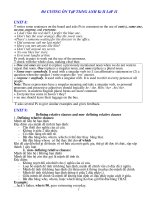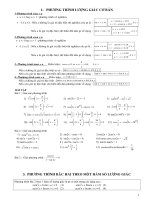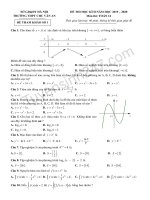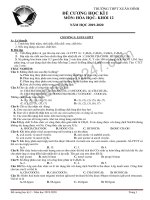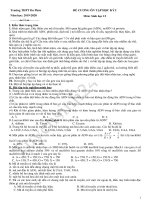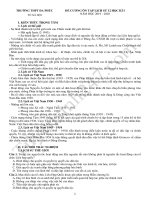Đề cương ôn tập kì 1 lớp 11 môn Anh năm 2018 - THPT Đa Phúc
Bạn đang xem bản rút gọn của tài liệu. Xem và tải ngay bản đầy đủ của tài liệu tại đây (420.94 KB, 6 trang )
<span class='text_page_counter'>(1)</span><div class='page_container' data-page=1>
<i><b>Da phuc high school </b></i>
<i><b>School year 2018- 2019 </b></i>
<i><b>REVISION FOR THE 1</b><b>st </b><b>TERM TEST – GRADE </b></i><b>(11 C, D-E) </b>
<b>A-</b> <b>Language: </b> <b>- Pronunciation: Elision of vowels, stress in two-syllable and three-syllable words </b>
- <b>Vocabulary: units 1,2,3,4 </b>
- <b>Grammar: + Modals: should, ought to, have to, must </b>
<b> + Linking verbs </b>
<b> + Cleft sentences </b>
<b> + To-infinitive after adjectives and nouns </b>
<b> + Verb tenses: present perfect & past simple </b>
<b>B-</b> <b>Skills: </b> <b>- Reading: Topics of units 1,2,3,4 </b>
<b>Questions: Close tests, reading comprehension </b>
- <b>Writing: Rewrite sentences using modals, using past simple/ present perfect, using cleft </b>
<b>sentences and using to-infinitive. </b>
<b>PRACTICE EXERCISES </b>
<b>I.</b> <b>Pronunciation </b>
1. A. elementary B. different C. interest D. vegetable
2. A. economy B. photograph C. voluntary D. secondary
3. A. library B. family C. dictionary D. illegal
4. A. teenage B. heritage C. advantage D. encourage
5. A. donate B. certificate C. integate D. grade
6. A. enthusiast B. together C. thousand D. youth
7. A. campaign B. impairment C. repair D. aware
8. A. blind B. prioritise C. finalcial D. mobility
9. A. accessible B. experience C. special D. force
10. A. curfew B. burden C. mature D. curtain
11. A. motivated B. prioritise C. confident D. conflict
12. A. sibling B. conservative C. counsellor D. casual
13. A. wisely B. width C. wisdom D. confident
14. A. possession B. discussion C. profession D. decision
15. A. contact B. initiative C. interact B. lifetime
<b>Stress </b>
1. A. flashy B. control C. donation D. equality
2. A. reconcile B. counselor C. sympathize D. emotion
3. A. appear B. depressed C. famous D. annoyed
4. A. wheelchair B. visual C. treatment D. impaired
5. A. charity B. kindness C. method D. society
6. A. community B. volunteer C. education D. population
7. A. disabled B. poverty C. barrier D. celebrate
8. A. community B. individual C. accessible D. forgettable
9. A. conduct B. campaign C. dedicate D. surroundings
10. A. difficulty B. memory C. obstacle D. impairment
11. A. curfew B. conflict C. donate D. hairstyle
12. A. impairment B. integrate C. motivate D. principle
13. A. romantic B. discipline C. reliant D. protective
14. A. wheelchair B. viewpoint C. nuclear D. respect
15. A. physical B. prioritise C. elegant D. confidently
<b>II.</b> <b>Choose the best option for each sentence:</b>
1. Young people ______ obey their parents. a. must b. may c. will d. ought to
2. Laura, you and the kids just have dinner without waiting for me. I ______ work very hard today.
a. can b. may c. should d. must
</div>
<span class='text_page_counter'>(2)</span><div class='page_container' data-page=2>
4. Jenny's engagement ring is enormous! It ______ have cost a fortune
a. must b. might c. will d. should
5. You ______ to write them today. a. should b. must c. had d. ought
6. I hope I ______ find it. a. will b. shall c. could d. must
7. Unless he runs he______ catch the train. a. will b. mustn’t c. wouldn’t d. won’t
8. We ______ have time to help you tomorrow. a. may b. must c. will d. could.
9. "______ you hand me that pair of scissors, please?" a. May b. Will c. Shall d. Should
10. Tom sounded________ when I spoke to him on the phone.
A. angry B. angrily C. to be angry D. to be angrily
11. The garden looks ____ since you tidied it up. A. better B. well C. more good D. more well
12. Your English is improving. It is getting ________A.well B. good C. much well D. clearly
13. The chef tasted the meat ________before presenting it to the president.
A. cautious B. more cautious C. cautiously D. much cautiously
14. He did not come and she looked rather_____A.worry B. worrying C. worrier D. worried
15. I’ll feel___ when my exams are over. A. happily B. more happily C. happy D. more happy
16. Although the dish smelt________, he refused to eat saying that he was not hungry.
A. bad B. good C. well D. worse
17. The fish tastes________. I won’t eat it. A. awful B. awfully C. more awfully D. as awful
18. The situation looks ________. We must do something. A.good B. well C. bad D. badly
19. He seemed to me a bit________ today. A.badly B. awfully C. strangely D. strange
20. John still hasn't come out. He ______ everything for the trip now.
A. must have been preparing b. will be preparing c. must be preparing d. will have prepared
21. Thomas received a warning for speeding. He _____ so fast.
A. shouldn't have driven b. would have driven c. should have d. might have driven
22. The photos are black. The X-ray at the airport _____ them.
A. should have damaged b. would damage c. would have damaged d. must have damaged
23. Many young people are striving……being independent. A. of B. for C. on D. with
24. A……..person is someone who is capable of doing things by himself rather than depending on other people for help.
A. self-determined B. self-discipline C. self-reliant D. self-confident
25. This special school helps students with ……….impairments to learn Braille.
A. hearing B. visual C. cognitive D. physical
26. This soup tastes………Tom cooks it ………..
A. nicely/ nicely B. nice/ nice C. nice/ nicely D. nicely/ nice
27. Have you heard about John? He has broken………with his girlfriend.
A. down B. out C. into D. up
28. He lent an ear………….me when I told him about my conflict with my parents.
A. for B. to C. with D. on
29. She can’t join us because has got a……….with her boyfriend this evening.
A. problem B. meeting C. date D. night
30. It………..my father that gave me this smartphone …….my birthday.
A. is/ on B. is/ at C. was/ on D. was/ at
31. Going into any argument, both sides know that either one is giong to change the other's...
A. head B. mind C. brain D. feeling
32. Parents should teach children about...by establishing a rule about knocking closed doors before entering.
A. loneliness B. care B. privacy D. peace
33. They were finally---with each other, after not speaking for nearly five years.
A. reconciled B. persuaded C. interested D. fond
34. Teenagers do not have to work and...on their favourite study, club activities and going out.
A. gather B. bring C. concentrate D. depend
35. It is Phong's sense of responsibility...makes him successful in his life.
A. that B. which C. who D. what
</div>
<span class='text_page_counter'>(3)</span><div class='page_container' data-page=3>
A. deal B. strive C. prioritise D. recognize
37. Kids need to have...to do things by themselves as early as possible.
A. offers B. jobs C. conditions D. opportunities
38. There are some specific stratergies that are useful in teaching a group which includes students with physical...
A. lack B. shortage C. impairment D. death
39. If you are aware of a person's mental illness, it should not affect the way you...with them.
A. intervene B. interfere C. affect D. interact
<b>III.</b> <b>Give the correct form of the words in the brackets. </b>
1. Peter is a very ………..(responsibility) student. He always completes his tasks on time and never need to be
reminded about ………..…..(assign) and other schoolwork.
2. He is also very ……….(determination). He usually tries to …………..….(solution) all difficult problems
himself though most of his friends give up.
3. He spends lots of time reading so he is ……….…..(well-inform) about what’s happening around the world.
4. He is always believes in himself and people really admire his ………….….(able) to make ………….……
(decide) quickly. He’s really ……….(confidence) and ………(decide).
5. Mark is a …………....…..(determine) young man. No one can stop him from achieving his goals.
6. Don’t be worried. You must ………..…(belief) in your own ability and have ……….……..…(confident) in yourself
to be …………..…(succeed).
7. In many countries, kids have been taught ………..…….(self-reliant) early, so they are very ………. (depend).
8. In case of emergency, you must act ……….(decide).
9. An ……….…(depend) person is capable of doing things by herself/ himself.
10. My teacher is able to make ………...(complicate) things easy to understand.
11. I’m sorry but I can’t get my parents’ ………(permit) to go on a picnic.
12. Lacking the skill of coping with loneliness may make you feel ……….(depress) and make wrong
………..…(decide) about your life.
13. Whenever I cannot fulfill all my ………(response), I will be punished.
14. In what way do parents keep their children ………..…(motivate)?
15. Lacking interpersonal………. (communicate) skills means you don’t feel ………….…………
(comfort) when talking to people or working in a group.
16. These children face significant challenges in their daily life including discrimination, limited………..
(access) to basic healthcare and other public services.
17. Young people who suffer from ………(deaf) can still contribute a lot to the society.
18. Students remember spending time at a school for students with ………(disable)
19. These volunteers mainly provided services and help for children with cognitive ………(impair)
20. For students with difficulties in……….(mobile), volunteers are always willing to take them to and from school.
<b>IV.</b> <b>Supply the correct form of the verbs in brackets: </b>
1. Did the teacher make you …………. ……….(finish) your homework?
2. John really enjoys …………. ………(spend) all day at the beach.
3. The president doesn’t mind ………. ………..(attack) by the press.
4. I expected ………. (meet) at the airport by my parents.
5. He advised me (consider)… ………….all the facts before (decide)…………(accept)… ………the job.
6. They refused (allow)…… …….us (go)… …….in without (sign)… ………..the book.
7. My uncle used (show)… …………...me where (go)… ……and what (buy)……
8. His doctor advised him (go)… ………to bed early.
9. The snow kept (fall)……….and the workmen grew tired of (try)………..(keep)……….the roads clear.
10. Nobody (be) in this house for a month. - Yes, somebody (be) here quite recently.
11. Some districts in Ho Chi Minh city (not have) ………… enough schools to give disabled children a good education in
the last decade.
12. Up to now, many parents of disabled children (not have)……… the awareness and skills to help their children to
develop and integrate into society.
</div>
<span class='text_page_counter'>(4)</span><div class='page_container' data-page=4>
14. The situation (recently / change)……….
15. Education for disabled children (meet) ………….with a lot of difficulties in the past.
16. So far, the center (receive)………….…. most of the fund for educating the disabled from local and foreign charities.
17. It (snow) heavily when he (wake) up.
18. How you (break) your leg? - I (fall) off the ladder when I (put) up the curtains.
19. I (play) football since I (be) five years old.
20. – You (see) the monkeys? – Yes, I have. I (see) them at the zoo last Sunday.
<b>V.</b> <b>Mistake recognition </b>
1. The Nelsons asked us look over their plants for them while they were away on vacation.
2. I couldn’t make my car to start this morning.
3. My boss doesn’t allow me using the telephone for private calls.
4. I’m delighted hearing that you have made much progress in your study recently.
5. She has a lot exercises do this evening.
6. It is impossible for me being there before 8.00 p.m.
7. I saw a man to jump through the widow five minutes ago, but I could not remember his face.
8. It was quite a surprise seeing him again.
9. I heard him to leave the house early this morning.
10. All students were allowed coming in the class.
11. This room is too small being in.
12. Approximately 70 percent of all parents let their children to choose their own future job.
13. You should make your parents be happy for the rest of their life.
14. There are a lot of work to do here.
15. Generation gap should be solving through mutual understanding.
<b>VI.</b> <b>Writing : Rewrite the following sentences with the same meaning using the given cues.</b>
1. Perhaps Susan knows the address. (may) =>Susan ...
2. It's possible that Joanna didn't receive my message. (might) =>Joanna ...
3. The report must be on my desk tomorrow. (has) =>The report ...
4. I managed to finish all my work. (able)=>I ...
5. It was not necessary for Nancy to clean the flat. (didn't) => Nancy ...
6. The best thing for you to do is to sit down sit down. (better)=>You ...
7. If I were in your shoes, I wouldn’t go out at that time (should)=>You………
8. You are not allowed to wear casual clothes to school. (must)=>You………..
9. Don’t open your eyes to see such scenes. (ought)=>You……….
10. We study English at school. It’s a compulsory subject. (have to)=>We……….
11. I know how to deal with the issue. (way)=>I know ………
12. I was surprised when I saw that my friend could do a magic. (see)=>I was surprised………..
11. That he decided to get married to that girl bored his parents. (decision)
12. I agreed with him when he suggested that he would take part in more outdoor activities. (suggestion)
13. She would like a job that will allow her to travel abroad a lot. (opportunity)
14. She was very disappointed because her father couldn’t attend the teacher-parent meeting. (failure)
15. He tried hard to pass the exam. (effort) =>...
16. I really want to go to Britain for further study. (desire) => ...
17. Mai was willing to help her friend to overcome his difficulties. (willingness)
18. The little boy was able to ride a bike on his own. (ability) =>...
<i><b>Combine the following simple sentences using an infinitive.</b></i>
1. I have engaged a private tutor. He will teach me English.
2. My mother was very much delighted. She had heard about my brother’s safe arrival.
3. He wants to win the first rank. He works hard for that reason.
4. He is so weak. He cannot walk without help.
5. The tea is too hot. I cannot drink it.
6. It’s impossible. He can’t keep his promise.
</div>
<span class='text_page_counter'>(5)</span><div class='page_container' data-page=5>
8. The proposal is quite unreasonable. It cannot be accepted.
9. I looked out of the window of my carriage. I wanted to see the green pastures.
10. She was excited. She gave birth to a beautiful baby.
<i><b>Use the cleft sentences to rewrite the following sentences focusing on</b><b>the underlined information </b></i>
1. She bought the car from Tom. (<i><b>Use the cleft sentence with the objective focus)</b></i>
2. My secretary sent the bill to Mr. Harding yesterday. <i><b>(Use the cleft sentence in the passive)</b></i>
3. Columbus sailed to America in 1492. (<i><b>Use the cleft sentence with the adverbial focus)</b></i>
4. The president makes the important decisions. (<i><b>Use the cleft sentence with the subjective focus)</b></i>
5. I met the same boy yesterday. <i><b>(Use the cleft sentence with the objective focus)</b></i>
6. We met each other at this tower. (<i><b>Use the cleft sentence with the adverbial focus)</b></i>
7. He is interested in reading books. (<i><b>Use the cleft sentence with the objective focus)</b></i>
8. The secretary sent Jack the photo last week. (<i><b>Use the cleft sentence with the subjective focus)</b></i>
9. She bought him a computer at this shop. (<i><b>Use the cleft sentence with the adverbial focus)</b></i>
10. Mary sent me the present by post. (<i><b>Use the cleft sentence with the objective focus)</b></i>
<b>VII. Reading comprehension: Choose the best option </b>
During the teenage years, many young peole can sometimes be difficult to talk to. They often seem to dislike being
questioned. They may seem unwilling to talk about their work in school. This is a normal development at this age, though
it can be very hard for parents to understand. It is part of becoming independent of teenagers trying to be adult while they
are still growing up. Young people are usually more willing to talk if they believe that questions are asked out of real
interest and not because people are trying to check up on them.
Parent should do their best to talk to their son or their daughter about school work and future plan but should not
push them to talk if they don't want to. Parents should also watch for the danger signs some young people in trying to be
adult may experiment with sex, drugs, alcohol or smoking. Parents need to watch for any signs of unusual behavour which
may be connected with these and get help if necessary.
1. This is from a ________
A. parents handbook B. school timetable C. teenage magazine D. children's book
2. What is the writer trying to do?
A. to be amusing B. to be argumentative C. to be helpful D. to be apologetic
3. Why do adults sometimes find teenagers difficult?
A. because most teenagers are quiet B. because teenagers don't want to talk to their parents
C. because teenagers hate adults D. because most teenagers hate adults
4. When can you expect a young person to be more talkative than usual?
A. When people talk to them because they are really interested and not just checking on them.
B. When adults talk to them about something other than their work in school.
C. When adults give them a lot of money to spend
D. When adults talk to them about sex, alcohol and drugs.
5. Some teenagers experiment with drinking and smoking because_______
A. hey regard it as mark of adulthood B. women like a smoking and drinking man
C. cigarettes and alcohol are cheap D. cigarettes and alcohol are available everywhere.
<b>VIII. Cloze test: Choose the best option to fill in each blank: </b>
In the home a dad is very important. He is the (1) ______ who provides us with money to feed and clothe
ourselves. He can decorate your bedroom, mend your radio, make cages for your pets, repair a puncture in your bicycle
tyre and help you with maths homework. A dad can be very useful for (2) ______ you in the car to and from parties,
music and dancing lessons.
A dad is the person whom you ask for pocket money. He is the one who (3) ______ about the time you spend talking on
the phone, as he has to pay for the bills. Dad is someone who will support you in a(n) (4) ______ , if he believes you to
be right. He is someone who reads your school (5) ______ and treats if it is good. A dad likes to come into a nice happy
home evening, and settle back in his chair with a newspaper.
</div>
<span class='text_page_counter'>(6)</span><div class='page_container' data-page=6>
2. A. bringing B. taking C. picking D. carrying
3. A. explains B. shouts C. complains D. groans
4. A. talk B. discussion C. disagreement D. argument
5. A. report B. result. C. record D. review
</div>
<!--links-->
